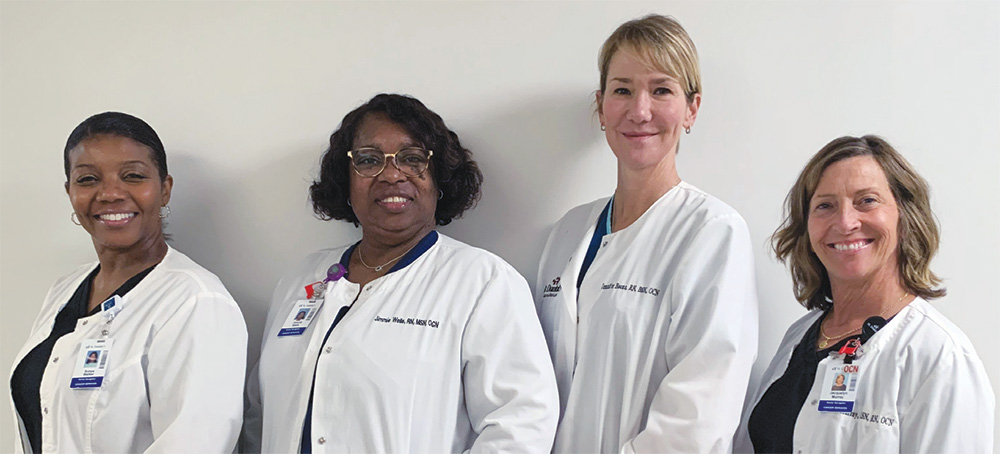By KATIE EUBANKS

Jackie Murray, far right, with the rest of the Oncology Navigator Team at St. Dominic.
MCL Editor Katie Eubanks recently interviewed Jackie Murray, an Oncology Nurse Navigator at St. Dominic Hospital in Jackson, about how she helps cancer patients navigate the spectrum of care. This interview has been edited for clarity and length.
Katie Eubanks: Tell me about being a Navigator.
Jackie Murray: We’re accredited as a comprehensive cancer center, which mandates a Navigator program. Navigators identify and mitigate barriers to care.
You get a diagnosis with lots of providers involved. And then you have a lead — sometimes it’s a surgeon, sometimes it’s an oncologist. It’s crazy and it’s all this new information coming to you. And the Navigator acts as sort of a safety net.
I’ve also heard the surgeon call us the tour guide. We meet you at different touch points. … And how much you need us will just vary by patient. … I do a lot of listening.
My goal is to help people feel connected to their healthcare community and know who to call when something goes wrong … and that can be counseling resources, financial, transportation — that’s a big barrier. People often drive several hours in.
What drives me to go to work every day (is) that personal, human side of medicine. If I can just make your day easier, because this is (as familiar to me as) my kitchen — I know the little ins and outs of how to pick up the phone or how to answer a question.
You have some families who really want to study and learn as much as they can. And there’s so much out there that’s not a good reputable resource. So we try really hard to connect people to foundations that we trust.
KE: What are the different touch points when you interact with cancer patients?
JM: I work with you when there’s a new diagnosis. That’s a time when I would come forward and introduce myself.
Another new beginning for me with a patient would be, you come in and there’s a great suspicion, so we’re doing a lot of biopsies and such. Or when there’s a reoccurrence (of cancer), or when we’ve got symptom management that’s put you in the hospital. When you’ve been through chemo, (you’ll) see me again when you go through your surgery.
Often I meet you in the hospital, or I would say in a clinic. I follow breast cancer and lung cancer, and some gynecological cancer.
We do an orientation program. We have a support group for the breast cancer folks … When they start (chemo), we sit with them. And then I go to the cardiovascular clinic as well, because our thoracic surgeons follow our lung cancer patients.
KE: What are the most common reactions you see from patients who’ve been diagnosed with cancer?
JM: It truly varies. … Frequently, patients are surprised — because ‘I just came in with a sore shoulder or a cough,’ or ‘I came in for an appendectomy, and you found this?’
(But) there’s always, always those unexpected gifts that come with a difficult time in your life, or an unexpected diagnosis. You meet people you never would’ve met. Nobody wakes up and wants to go to the hospital today. But (we’ll) hear time and again, ‘I’m going to give it to God. I’m not going to worry about this.’ It’s a very beautiful thing to see.
That is the best gift of my job.
KE: Is there anything else you want people to know about cancer treatment or prevention?
JM: I guess I’d say two things for sure:
With the molecular biology and the targeted immunotherapy, our treatment modalities are getting so much better. It’s not one-size-fits-all.
Also, I would talk about how important it is to get those screenings; I want to scream that from the rooftops. Our standards for when we do our colonoscopies used to be (age) 50, and now it’s 45. And if you have family history, you might do some of that sooner.